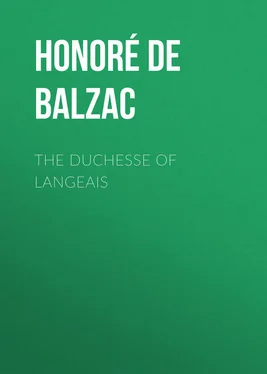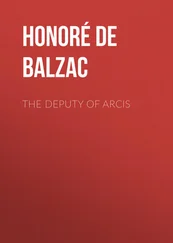Honoré Balzac - The Duchesse of Langeais
Здесь есть возможность читать онлайн «Honoré Balzac - The Duchesse of Langeais» — ознакомительный отрывок электронной книги совершенно бесплатно, а после прочтения отрывка купить полную версию. В некоторых случаях можно слушать аудио, скачать через торрент в формате fb2 и присутствует краткое содержание. Жанр: literature_19, foreign_antique, foreign_prose, на английском языке. Описание произведения, (предисловие) а так же отзывы посетителей доступны на портале библиотеки ЛибКат.
- Название:The Duchesse of Langeais
- Автор:
- Жанр:
- Год:неизвестен
- ISBN:нет данных
- Рейтинг книги:3 / 5. Голосов: 1
-
Избранное:Добавить в избранное
- Отзывы:
-
Ваша оценка:
- 60
- 1
- 2
- 3
- 4
- 5
The Duchesse of Langeais: краткое содержание, описание и аннотация
Предлагаем к чтению аннотацию, описание, краткое содержание или предисловие (зависит от того, что написал сам автор книги «The Duchesse of Langeais»). Если вы не нашли необходимую информацию о книге — напишите в комментариях, мы постараемся отыскать её.
The Duchesse of Langeais — читать онлайн ознакомительный отрывок
Ниже представлен текст книги, разбитый по страницам. Система сохранения места последней прочитанной страницы, позволяет с удобством читать онлайн бесплатно книгу «The Duchesse of Langeais», без необходимости каждый раз заново искать на чём Вы остановились. Поставьте закладку, и сможете в любой момент перейти на страницу, на которой закончили чтение.
Интервал:
Закладка:
This distinction between the upper and lower spheres of social activity, emphasized by differences in their manner of living, necessarily implies that in the highest aristocracy there is real worth and some distinguishing merit. In any state, no matter what form of “government” is affected, so soon as the patrician class fails to maintain that complete superiority which is the condition of its existence, it ceases to be a force, and is pulled down at once by the populace. The people always wish to see money, power, and initiative in their leaders, hands, hearts, and heads; they must be the spokesmen, they must represent the intelligence and the glory of the nation. Nations, like women, love strength in those who rule them; they cannot give love without respect; they refuse utterly to obey those of whom they do not stand in awe. An aristocracy fallen into contempt is a roi faineant , a husband in petticoats; first it ceases to be itself, and then it ceases to be.
And in this way the isolation of the great, the sharply marked distinction in their manner of life, or in a word, the general custom of the patrician caste is at once the sign of a real power, and their destruction so soon as that power is lost. The Faubourg Saint-Germain failed to recognise the conditions of its being, while it would still have been easy to perpetuate its existence, and therefore was brought low for a time. The Faubourg should have looked the facts fairly in the face, as the English aristocracy did before them; they should have seen that every institution has its climacteric periods, when words lose their old meanings, and ideas reappear in a new guise, and the whole conditions of politics wear a changed aspect, while the underlying realities undergo no essential alteration.
These ideas demand further development which form an essential part of this episode; they are given here both as a succinct statement of the causes, and an explanation of the things which happen in the course of the story.
The stateliness of the castles and palaces where nobles dwell; the luxury of the details; the constantly maintained sumptuousness of the furniture; the “atmosphere” in which the fortunate owner of landed estates (a rich man before he was born) lives and moves easily and without friction; the habit of mind which never descends to calculate the petty workaday gains of existence; the leisure; the higher education attainable at a much earlier age; and lastly, the aristocratic tradition that makes of him a social force, for which his opponents, by dint of study and a strong will and tenacity of vocation, are scarcely a match-all these things should contribute to form a lofty spirit in a man, possessed of such privileges from his youth up; they should stamp his character with that high self-respect, of which the least consequence is a nobleness of heart in harmony with the noble name that he bears. And in some few families all this is realised. There are noble characters here and there in the Faubourg, but they are marked exceptions to a general rule of egoism which has been the ruin of this world within a world. The privileges above enumerated are the birthright of the French noblesse, as of every patrician efflorescence ever formed on the surface of a nation; and will continue to be theirs so long as their existence is based upon real estate, or money; domaine-sol and domaine-argent alike, the only solid bases of an organized society; but such privileges are held upon the understanding that the patricians must continue to justify their existence. There is a sort of moral fief held on a tenure of service rendered to the sovereign, and here in France the people are undoubtedly the sovereigns nowadays. The times are changed, and so are the weapons. The knight-banneret of old wore a coat of chain armor and a hauberk; he could handle a lance well and display his pennon, and no more was required of him; today he is bound to give proof of his intelligence. A stout heart was enough in the days of old; in our days he is required to have a capacious brain-pan. Skill and knowledge and capital – these three points mark out a social triangle on which the scutcheon of power is blazoned; our modern aristocracy must take its stand on these.
A fine theorem is as good as a great name. The Rothschilds, the Fuggers of the nineteenth century, are princes de facto . A great artist is in reality an oligarch; he represents a whole century, and almost always he is a law to others. And the art of words, the high pressure machinery of the writer, the poet’s genius, the merchant’s steady endurance, the strong will of the statesman who concentrates a thousand dazzling qualities in himself, the general’s sword – all these victories, in short, which a single individual will win, that he may tower above the rest of the world, the patrician class is now bound to win and keep exclusively. They must head the new forces as they once headed the material forces; how should they keep the position unless they are worthy of it? How, unless they are the soul and brain of a nation, shall they set its hands moving? How lead a people without the power of command? And what is the marshal’s baton without the innate power of the captain in the man who wields it? The Faubourg Saint-Germain took to playing with batons, and fancied that all the power was in its hands. It inverted the terms of the proposition which called it into existence. And instead of flinging away the insignia which offended the people, and quietly grasping the power, it allowed the bourgeoisie to seize the authority, clung with fatal obstinacy to its shadow, and over and over again forgot the laws which a minority must observe if it would live. When an aristocracy is scarce a thousandth part of the body social, it is bound today, as of old, to multiply its points of action, so as to counterbalance the weight of the masses in a great crisis. And in our days those means of action must be living forces, and not historical memories.
In France, unluckily, the noblesse were still so puffed up with the notion of their vanished power, that it was difficult to contend against a kind of innate presumption in themselves. Perhaps this is a national defect. The Frenchman is less given than anyone else to undervalue himself; it comes natural to him to go from his degree to the one above it; and while it is a rare thing for him to pity the unfortunates over whose heads he rises, he always groans in spirit to see so many fortunate people above him. He is very far from heartless, but too often he prefers to listen to his intellect. The national instinct which brings the Frenchman to the front, the vanity that wastes his substance, is as much a dominant passion as thrift in the Dutch. For three centuries it swayed the noblesse, who, in this respect, were certainly pre-eminently French. The scion of the Faubourg Saint-Germain, beholding his material superiority, was fully persuaded of his intellectual superiority. And everything contributed to confirm him in his belief; for ever since the Faubourg Saint-Germain existed at all – which is to say, ever since Versailles ceased to be the royal residence – the Faubourg, with some few gaps in continuity, was always backed up by the central power, which in France seldom fails to support that side. Thence its downfall in 1830.
At that time the party of the Faubourg Saint-Germain was rather like an army without a base of operation. It had utterly failed to take advantage of the peace to plant itself in the heart of the nation. It sinned for want of learning its lesson, and through an utter incapability of regarding its interests as a whole. A future certainty was sacrificed to a doubtful present gain. This blunder in policy may perhaps be attributed to the following cause.
The class-isolation so strenuously kept up by the noblesse brought about fatal results during the last forty years; even caste-patriotism was extinguished by it, and rivalry fostered among themselves. When the French noblesse of other times were rich and powerful, the nobles ( gentilhommes ) could choose their chiefs and obey them in the hour of danger. As their power diminished, they grew less amenable to discipline; and as in the last days of the Byzantine Empire, everyone wished to be emperor. They mistook their uniform weakness for uniform strength.
Читать дальшеИнтервал:
Закладка:
Похожие книги на «The Duchesse of Langeais»
Представляем Вашему вниманию похожие книги на «The Duchesse of Langeais» списком для выбора. Мы отобрали схожую по названию и смыслу литературу в надежде предоставить читателям больше вариантов отыскать новые, интересные, ещё непрочитанные произведения.
Обсуждение, отзывы о книге «The Duchesse of Langeais» и просто собственные мнения читателей. Оставьте ваши комментарии, напишите, что Вы думаете о произведении, его смысле или главных героях. Укажите что конкретно понравилось, а что нет, и почему Вы так считаете.












